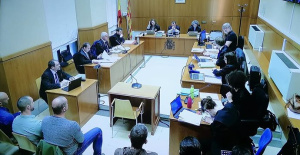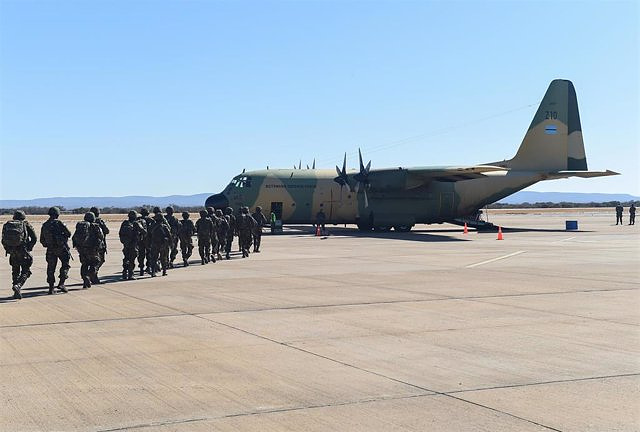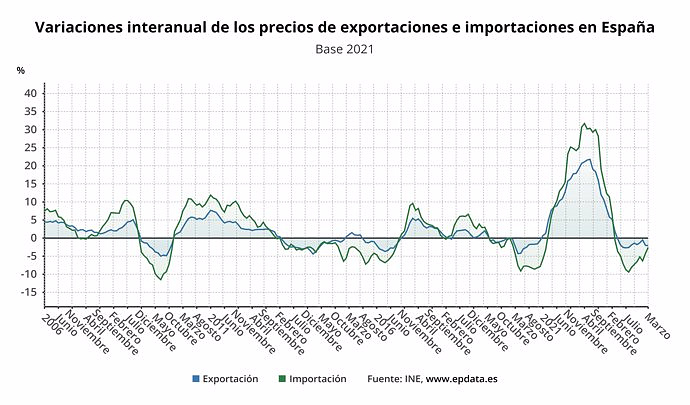A UN committee puts the combatants at around 280 but warns that they are more seasoned
MADRID, 18 Feb. (EUROPA PRESS) -
The presence of Rwandan troops and the Southern African Development Community (SADC) in northern Mozambique has helped reduce the number of militants joining the ranks of the Islamic State affiliate, but It has not yet managed to end the presence of this group, which threatens economic interests in the province of Cabo Delgado.
This is clear from the latest report published by the UN committee in charge of monitoring the sanctions imposed on the Islamic State and Al Qaeda and which covers the second half of 2022. Following the deployment of regional troops in Cabo Delgado as of summer of 2021 "the trajectory of the conflict has changed significantly", highlights the report, prepared based on the information provided by the member states, stressing that their presence has affected "their leadership, command structure and bases".
In this sense, it indicates that the affiliate of the Islamic State - which is popularly known in the area as Al Shabaab and which has no relationship with the group of the same name that operates in Somalia and is linked to Al Qaeda - has currently with some 280 combatants, compared to the initial 2,500, and highlights that in the last six months between 70 and 120 combatants and commanders have died in military operations.
However, the militants who still make up Islamic State Mozambique -- the group initially operated under the acronym Islamic State in Central Africa -- are now "seasoned fighters, able to move and strike strategically, relying on independent local networks and well established to obtain aid, knowledge and a flow of foreign fighters".
Regarding this last issue, the report indicates that in the ranks of the group there are fighters who came mainly from Kenya and Tanzania, and to a lesser extent from the Democratic Republic of the Congo, Somalia and Uganda and highlights that in recent times they have shown "greater coordination strategic and tactical" that has allowed them to overwhelm regional forces and carry out attacks against the civilian population and other targets as well as against strategic mining companies.
In general, the militants attack villages to get supplies, although in many cases they leave behind dead and beheaded people, and police arsenals to equip themselves with weapons. Despite the fact that fatalities are decreasing, the report highlights, the attacks "have serious economic consequences and cause massive displacements" of the population.
In this sense, between June and July there were more than 161,000 displaced people in the districts of Ancuabe and Chiure alone, where the violence is now spreading, as a result of a wave of attacks. Although Islamic State started its operations mainly in the north of Cabo Delgado, it is now extending its area of operation to the south and has also carried out attacks in the neighboring province of Nampula.
The UN committee highlights the seizure last July of an important Islamic State base in the Macomia district, an operation during which its leader, a Tanzanian known as Sheikh Assane, was eliminated, although the head of operations, Bonomade Machude Omar, managed to escape.
According to information collected from member states, the group has Abu Yasir Hasan, a Tanzanian, as its spiritual leader, while there is no evidence that the central nucleus of the Islamic State, located in Syria and Iraq, "has command and control" over this subsidiary. However, "long-standing relationships of the leaders with experienced foreign fighters" linked to other groups on the continent have been verified.
The fact that the group is made up of "semi-autonomous cells that do not adhere to a strict hierarchical command structure," makes them "agile and adept at change." Likewise, it is believed that an instructor recently arrived in northern Mozambique to train the militiamen "in the construction of improvised explosive devices", while there is also evidence of the delivery of weapons by sea "using plastic bags with markers "as well as surveillance drones.
In this context of a relative improvement in the situation on the ground, the visit to Cabo Delgado two weeks ago by the president of Total, Patrick Pouyanné, who met with the president of the country, Filipe Nyusi, and had the opportunity to visit the area on the Afungi peninsula, where French energy plans to carry out a major liquefied natural gas (LNG) exploitation project.
The French company halted the project and withdrew all its staff in April 2021 following an attack by jihadists. Now, Pouyanné has commissioned an independent expert to prepare a report on "the humanitarian situation" in the province that must be presented before the end of February and based on which it will be decided "if the conditions exist to resume project activities ".
Pouyanné acknowledged that "since 2021 the situation in Cabo Delgado has improved significantly thanks in particular to the support provided by African countries that have committed to restoring peace and security", while insisting that in order for Total to be able to resume its project it is necessary to "restore security in the region, the resumption of public services and the return to normal life of the population."
The resumption of this project would be good news for Mozambique, given its scale, but also for Europe at a time when it continues to seek to diversify its sources of energy supply in the wake of the Russian invasion of Ukraine.
But the jihadists are not only a threat to gas exploitation in Cabo Delgado, but also to another of the main sources of wealth in the region, that of precious stones. Last Sunday, insurgents attacked the town of Nairoto, in the Montepuez district, killing five members of the security forces and causing the evacuation of a gold mining project owned by the British company Gemfields.
This company is precisely the owner of an important ruby mine also located in Montepuez, whose operations have not been affected by this latest attack. In recent months there have been several attacks in this district, which shows the jihadists' interest in affecting mining operations, an important source of income for the country.
For its part, the latest Cabo Ligado bulletin, prepared by the ACLED project, warns that the Islamic State is immersed in a campaign to win the support of the population, especially in Mocimboa da Praia, where it began its activity in 2017. As he reveals, there has been a meeting with residents to guarantee that they will leave them alone as long as they do not collaborate with the security forces.

 Exploring Cardano: Inner Workings and Advantages of this Cryptocurrency
Exploring Cardano: Inner Workings and Advantages of this Cryptocurrency Seville.- Economy.- Innova.- STSA inaugurates its new painting and sealing hangar in San Pablo, for 18 million
Seville.- Economy.- Innova.- STSA inaugurates its new painting and sealing hangar in San Pablo, for 18 million Innova.- More than 300 volunteers join the Andalucía Compromiso Digital network in one month to facilitate access to ICT
Innova.- More than 300 volunteers join the Andalucía Compromiso Digital network in one month to facilitate access to ICT Innova.-AMP.- Ayesa acquires 51% of Sadiel, which will create new technological engineering products and expand markets
Innova.-AMP.- Ayesa acquires 51% of Sadiel, which will create new technological engineering products and expand markets Sentences of up to 7 years for four police officers for illegal detention and injuries to a young man in Barcelona
Sentences of up to 7 years for four police officers for illegal detention and injuries to a young man in Barcelona They investigate in Jaén the death of a six-year-old boy whose mother shows signs of self-harm
They investigate in Jaén the death of a six-year-old boy whose mother shows signs of self-harm The judge orders Rubiales to appear in court once a month and ask for permission if he travels abroad
The judge orders Rubiales to appear in court once a month and ask for permission if he travels abroad Scotland's First Minister resigns after the breakdown of the Government coalition
Scotland's First Minister resigns after the breakdown of the Government coalition How Blockchain in being used to shape the future
How Blockchain in being used to shape the future Not just BTC and ETH: Here Are Some More Interesting Coins Worth Focusing on
Not just BTC and ETH: Here Are Some More Interesting Coins Worth Focusing on They create a bank of machinery sounds to prevent breakdowns through artificial intelligence
They create a bank of machinery sounds to prevent breakdowns through artificial intelligence UPV students build a prototype of a wooden house to move to Equatorial Guinea
UPV students build a prototype of a wooden house to move to Equatorial Guinea The UA opens the call for the Impulso 2024 Awards for the best innovative business initiatives
The UA opens the call for the Impulso 2024 Awards for the best innovative business initiatives ALI, virtual assistant from Alicante, internationally recognized by the OECD
ALI, virtual assistant from Alicante, internationally recognized by the OECD A million people demonstrate in France against Macron's pension reform
A million people demonstrate in France against Macron's pension reform Russia launches several missiles against "critical infrastructure" in the city of Zaporizhia
Russia launches several missiles against "critical infrastructure" in the city of Zaporizhia A "procession" remembers the dead of the Calabria shipwreck as bodies continue to wash up on the shore
A "procession" remembers the dead of the Calabria shipwreck as bodies continue to wash up on the shore Prison sentences handed down for three prominent Hong Kong pro-democracy activists
Prison sentences handed down for three prominent Hong Kong pro-democracy activists ETH continues to leave trading platforms, Ethereum balance on exchanges lowest in 3 years
ETH continues to leave trading platforms, Ethereum balance on exchanges lowest in 3 years Investors invest $450 million in Consensys, Ethereum incubator now valued at $7 billion
Investors invest $450 million in Consensys, Ethereum incubator now valued at $7 billion Alchemy Integrates Ethereum L2 Product Starknet to Enhance Web3 Scalability at a Price 100x Lower Than L1 Fees
Alchemy Integrates Ethereum L2 Product Starknet to Enhance Web3 Scalability at a Price 100x Lower Than L1 Fees Mining Report: Bitcoin's Electricity Consumption Declines by 25% in Q1 2022
Mining Report: Bitcoin's Electricity Consumption Declines by 25% in Q1 2022 Oil-to-Bitcoin Mining Firm Crusoe Energy Systems Raised $505 Million
Oil-to-Bitcoin Mining Firm Crusoe Energy Systems Raised $505 Million Microbt reveals the latest Bitcoin mining rigs -- Machines produce up to 126 TH/s with custom 5nm chip design
Microbt reveals the latest Bitcoin mining rigs -- Machines produce up to 126 TH/s with custom 5nm chip design Bitcoin's Mining Difficulty Hits a Lifetime High, With More Than 90% of BTC Supply Issued
Bitcoin's Mining Difficulty Hits a Lifetime High, With More Than 90% of BTC Supply Issued The Biggest Movers are Near, EOS, and RUNE during Friday's Selloff
The Biggest Movers are Near, EOS, and RUNE during Friday's Selloff Global Markets Spooked by a Hawkish Fed and Covid, Stocks and Crypto Gain After Musk Buys Twitter
Global Markets Spooked by a Hawkish Fed and Covid, Stocks and Crypto Gain After Musk Buys Twitter Bitso to offset carbon emissions from the Trading Platform's ERC20, ETH, and BTC Transactions
Bitso to offset carbon emissions from the Trading Platform's ERC20, ETH, and BTC Transactions Draftkings Announces 2022 College Hoops NFT Selection for March Madness
Draftkings Announces 2022 College Hoops NFT Selection for March Madness























